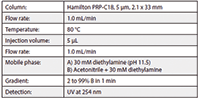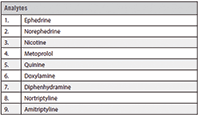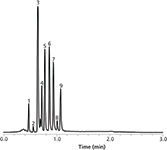High pH and Elevated Temperatures for Fast Separation of Strongly Basic Drug Compounds
Two important but frequently underutilized tools in methods development are mobile-phase pH and elevated temperatures. Hamilton's PRP-C18 column is well-suited for high pH and high temperature applications because the polymer-based stationary phase is chemically inert and has excellent thermal stability above 100 °C.

In modern drug discovery, where analytical HPLC can be a bottleneck, production is streamlined through the use of shorter columns with smaller particles, operated at higher flow rates. The flexibility to employ a high pH mobile phase and elevated temperatures represents further valuable tactics in methods development. These tools, often underutilized or not practical with silica-based columns, enable rapid separation of closely-related basic solutes in their charge-neutral forms that would otherwise be coeluted under non-alkaline, ambient temperature conditions.

In this study, nine structurally-diverse, strongly basic drug compounds are resolved in less than 2 min using a high pH mobile phase and a fast acetonitrile gradient at 80 °C.


Hamilton Company
4970 Energy Way, Reno, NV 89502
tel. (775) 858-3000, (800) 648-5950
Website: www.hamiltoncompany.com
Determining Enhanced Sensitivity to Odors due to Anxiety-Associated Chemosignals with GC
May 8th 2025Based on their hypothesis that smelling anxiety chemosignals can, like visual anxiety induction, lead to an increase in odor sensitivity, a joint study between the University of Erlangen-Nuremberg (Erlangen, Germany) and the Fraunhofer Institute for Process Engineering and Packaging (Freising, Germany) combined behavioral experiments, odor profile analysis by a trained panel, and instrumental analysis of odorants (gas chromatography-olfactometry) and volatiles (gas chromatography-mass spectrometry).
Investigating 3D-Printable Stationary Phases in Liquid Chromatography
May 7th 20253D printing technology has potential in chromatography, but a major challenge is developing materials with both high porosity and robust mechanical properties. Recently, scientists compared the separation performances of eight different 3D printable stationary phases.
Detecting Hyper-Fast Chromatographic Peaks Using Ion Mobility Spectrometry
May 6th 2025Ion mobility spectrometers can detect trace compounds quickly, though they can face various issues with detecting certain peaks. University of Hannover scientists created a new system for resolving hyper-fast gas chromatography (GC) peaks.

.png&w=3840&q=75)

.png&w=3840&q=75)



.png&w=3840&q=75)



.png&w=3840&q=75)



















